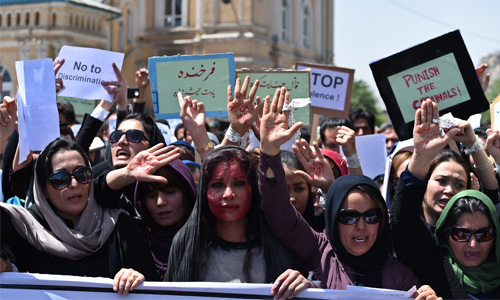W |
hile enumerating comparative advancements and achievements of the so-called democratic system in Afghanistan in the last 19 years, we must never forget that the ones pertaining to women rights are meager. Definitely, some changes are there; however, those changes are prevalent only on the exterior, while the intricate social fabric within Afghan society remains totally discriminating towards women. Religious conservatism and outdated tribal norms have vehemently dominated the Afghan social structure. The majority of self-designed religious teachings and tribal values are against women and discriminate against their basic human rights. Unfortunately, even to the point of brutality, these standards and doctrines discriminate and torture women, often physically, and publicly.
So, discrimination against women is now a part of social behavior in Afghanistan; but, as it is said, things worsen as the society goes through chaos and disorder. Though all the strata of society are influenced in such cases, the discriminated strata face most of the aftershocks; sadly, women form one of the same strata. They bear the brunt of instability and disorder as it is their benefits and privileges (if any) that are withdrawn at the very first step. The same can be observed in Afghanistan nowadays, particularly, in the repercussion of persistent instability and the ongoing disturbance by the COVID-19 pandemic.
Unfortunately, the law and order in the country does not stand with the women or protect them against different sorts of injustice and violence. For example, in Afghanistan child marriages are a common practice, and the justice system has failed to tackle it properly. The girls are entangled in responsibilities of marriage and are sandwiched in the complexities of life. Another feature of Afghanistan’s traditional marriage system is that after marriage, the girls are simply treated as commodities purchased by the men in order to use them as they please. And, women are expected to remain silent in response to all such unjust and inhumane behavior. Even if they are able to approach the justice system in a very rare cases, they are not entertained as they should be.
A report by United Nations Assistance Mission in Afghanistan (UNAMA) and the United Nations Human Rights Office – In Search of Justice for Crimes of Violence Against Women and Girls – released on Dec. 07, 2020, reveals that the burden of making the system work is for the most part borne by the women and girls themselves, particularly in cases of child marriages, instead of the Afghan justice system working effectively on behalf of female victims of violence. The report analyzing the judicial processing of around 303 crimes of violence against women and girls in Afghanistan between Sept. 2018 and Feb. 2020, concludes that while the justice system’s response to female victims of violence has improved in recent years, it continues to fail them in many respects. Only half of the documented crimes of violence against women and girls reach a court and impunity remains prevalent. Prosecution of most crimes listed under Afghanistan’s Elimination of Violence Against Women Law (EVAW Law) depend on the victim or her attorney filing a complaint, and the case stops if the victim withdraws her complaint. This places an enormous burden on women, especially when reporting such a crime may place the victim at odds with her family and community, and even put her in danger.
Meanwhile, regarding the child marriages, the report shows even more disheartening situation: Of 16 cases of child marriage documented in the report, only one results in the conviction of the perpetrator. Given that the vast majority of child marriages are arranged or condoned by the girls’ families, it is unrealistic to expect that girls themselves would be able to register a complaint and pursue it through the courts.
Michelle Bachelet – the UN High Commissioner for Human Rights – therefore, says, “In far too many cases, the EVAW Law re-victimizes women and girls who have already suffered enormously. It is appalling that survivors who have been beaten or married against their will are left to fend for themselves and that the State does not protect them unless they bring and pursue their complaint. I call on the Afghan authorities to amend the EVAW Law to ensure that authorities have the power to investigate and prosecute all offences irrespective of whether the victim files or withdraws her complaint.”
The report highlights that another major concern regarding women rights is the so-called Honor Killing. The women are believed to have dishonored a family or even a tribe, if they do not follow the instructions given by their male ‘guardians’. In some cases, if they leave their homes without the permission of male members, they are blamed for having attempted Zina and can be punished severely; some resulting in death through stoning. The report mentioned above reveals that if such killings are carried out the conviction rate for them remains very low (22.7 percent). Therefore, those involved in such killings are further encouraged to continue their practices.
Thus, the facts mentioned above clearly highlight the insufficient nature of the prevailing justice system in the country that is neither capable of stopping the discrimination and violent crimes against women, nor has the potential to discourage them. Therefore, there is a crying need of tangible measures in this regard in the short run. However, in the long-run, the society, as a whole, needs to realize that women are an intrinsic part of society and have a major role to play in its development. Their representation and engagement in different walks of life can make a real difference, and neglecting them such a participation will ultimately result in wastage of valuable human resource for the country.

